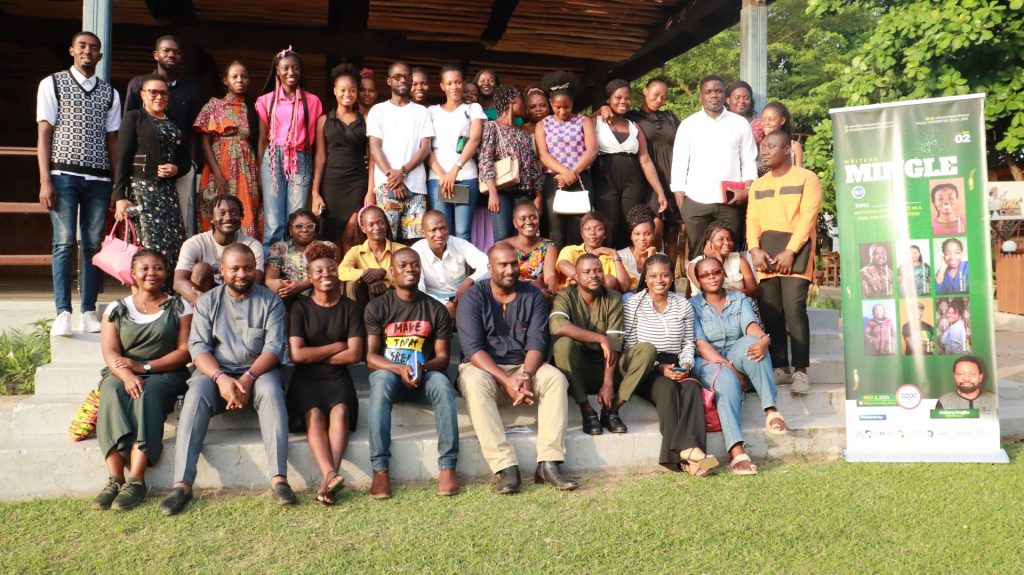
The Influence of Artificial Intelligence on African Literature: Highlights from the 2023 African Writers Conference
Written by Efua Eshun
Edited by Olamide Ojediran
Accra, Ghana – From November 2nd to 5th, the vibrant 6th edition of the African Writers Conference captivated the literary world, drawing esteemed writers, novelists, poets, publishers, and book enthusiasts from various African countries. This immersive event unfolded in a series of engaging activities, providing a platform for creative exploration and thought-provoking discussions. The conference commenced on Thursday, November 2nd, with a captivating creative writing workshop held at the E-Ananse library in East Legon. Renowned facilitators Nahida Esmail from Tanzania and Grace Tendo from Uganda led an enlightening session focused on children’s literature. Simultaneously, other workshops delved into poetry, led by Funminiyi Akinrinade from Nigeria and Nicole Gandaho from Benin Republic, fiction, guided by Khumoetsile Magonare D’Arcy from Botswana, and creative non-fiction, facilitated by Efua Eshun from the host country. Participants eagerly immersed themselves in these diverse workshops, enriching their literary skills. Following the workshop, some attendees embarked on a captivating tour of a nearby art gallery and various entertainment venues, fostering a sense of camaraderie among participants.
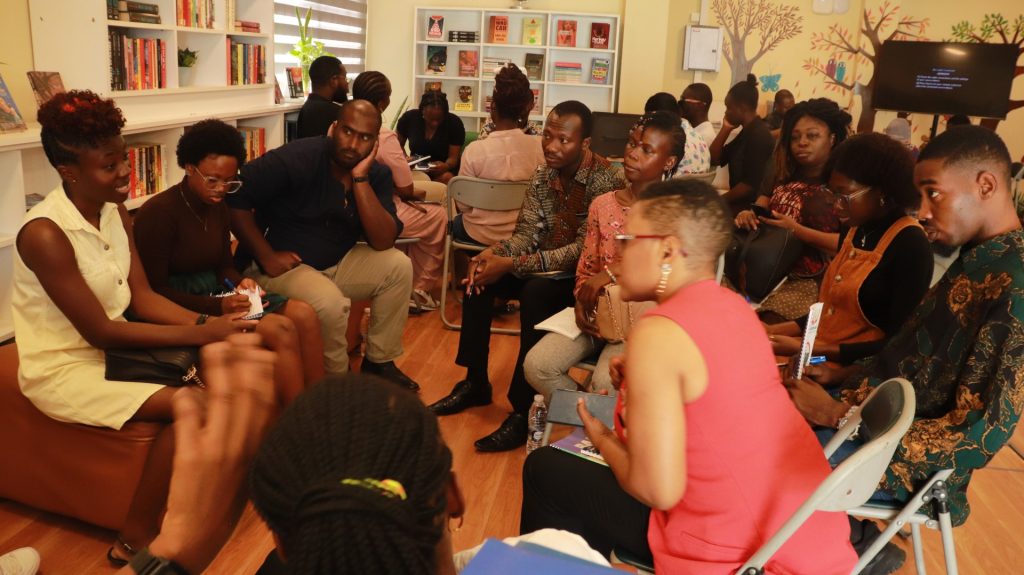
On the 3rd of November, the conference hosted the highly anticipated 6th edition of the Writers’ Mingle at the esteemed Alliance Francaise d’Accra. This enthralling event featured a 90-minute panel discussion centred around the theme “Artificial Intelligence as a Tool for African Writers.” Esteemed panellists included Elizabeth Dwamena-Asare from Ghana, Funminiyi Akinrinade (Keks) from Nigeria, Grace Christos from Nigeria, Eben Ace from Ghana, Halieo Montanyane from Lesotho, and Anton Pillay from South Africa, who replaced Autricia Timti from Cameroon. The insightful conversation was expertly moderated by Anthony ‘PenBoss’ Onugba, the founder of Writers Space Africa (WSA) and the African Writers Conference and Awards.
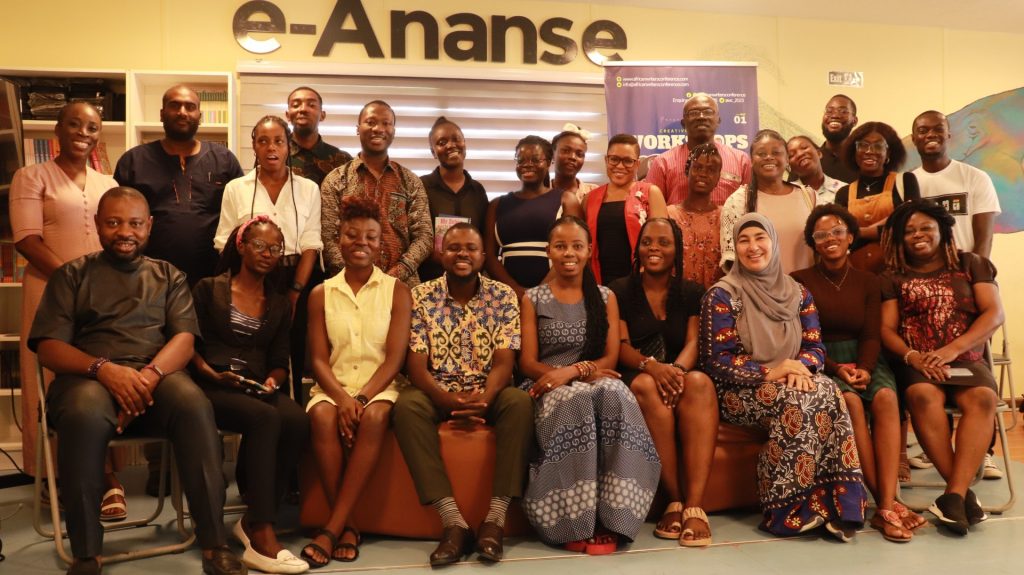
During the discussion, Grace Christos expressed her reservations about using AI extensively due to its limitations. As a lawyer, she voiced concerns about copyright issues surrounding data generated by AI, such as ChatGPT. Anton Pillay regarded AI as a potentially colonial tool, highlighting the importance of scrutinizing the motives of its creators. Nonetheless, he acknowledged employing AI for mundane tasks like report writing. When contemplating the impact of AI on writers’ livelihoods, Elizabeth emphasized that in the short term, AI may not render writers obsolete. However, she cautioned that failure to evolve and nurture creativity could result in AI overtaking the industry in the long run. Keks concurred, stating that AI would only threaten those who resist innovation and fail to cultivate their creative abilities to remain relevant.
When asked about the future prospects of African writers, Eben emphasized the importance of authors crafting their own narratives rather than relying on machines. Halieo on the other hand, expressed optimism, citing the scarcity of African-focused data available to AI systems, which presented an opportunity for African writers to shape their own stories. Grace added that the presence and potential threat of AI’s capabilities would drive African writers to harness their full potential as humans, thereby fortifying their position as storytellers. Conversely, Keks expressed concerns about the potential assimilation of African writers’ works by AI, potentially compromising their unique voices, creativity, and originality. He emphasized the need to establish boundaries in AI-human interactions and relationships.

As the Writers’ Mingle drew to a close, the audience actively participated, posing thought-provoking questions and offering insightful contributions. One attendee encouraged African writers not to grant AI excessive power, ensuring they maintain their sense of self-worth. Another suggested embracing AI while learning to adapt, acknowledging its permanence in the literary landscape and exploring ways to harness its benefits. These perspectives emphasized the importance of approaching AI with rationality and finding ways to utilize it without relinquishing the creative power and human intelligence inherent in the writing process.
The culmination of the conference took place on Saturday, November 4th, at the UniMAC-IJ North Dzorwulu Campus. The conference hall buzzed with excitement as writers from across Africa, including students from Uni-MAC-IJ, gathered to partake in this momentous occasion. The keynote address was delivered by Mr. David Dankwa Apawu on behalf of Prof. Eric Opoku Mensah, the institute’s acting rector, exploring the theme “The Impact of Artificial Intelligence on African Literature.” This was followed with an awe-inspiring spoken word performance by Kwabena Churchill-MOMC from WSA’s Ghana chapter.
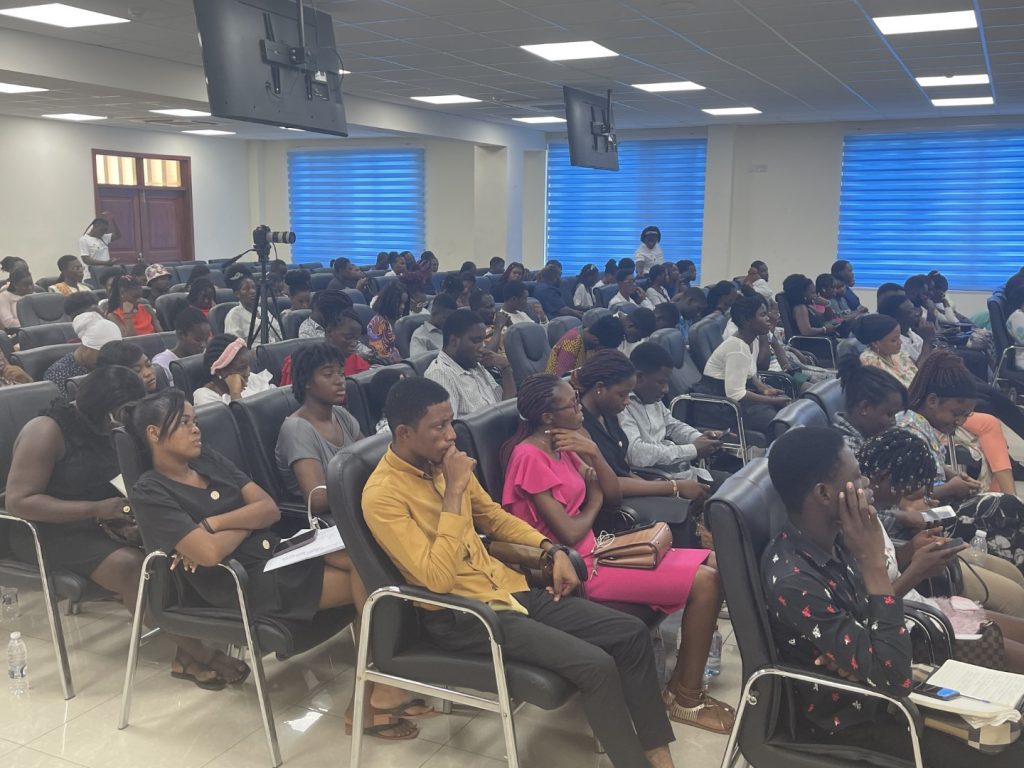
Following the captivating spoken word performance, the conference continued with a thought-provoking panel discussion led by Elizabeth Dwamena-Asare. The panelists for this session included Nana Kwabena Baah, Funminiyi Akinrinade (replacing Bisi Adjapon), Joshua Neequaye Robertson, and Nahida Esmail. Throughout the discussion, the panelists emphasized that AI should be viewed as a complementary tool designed to assist writers in their creative processes as it could be effectively utilized for tasks such as self-editing, generating creative writing ideas, and report writing. However, they cautioned against relying on AI for writing full books or stories, citing concerns related to the lack of personal fulfillment and bragging rights associated with such works. Additionally, issues of plagiarism and copyright were raised, further supporting the idea that AI should be used as a supportive tool rather than a replacement for human creativity.
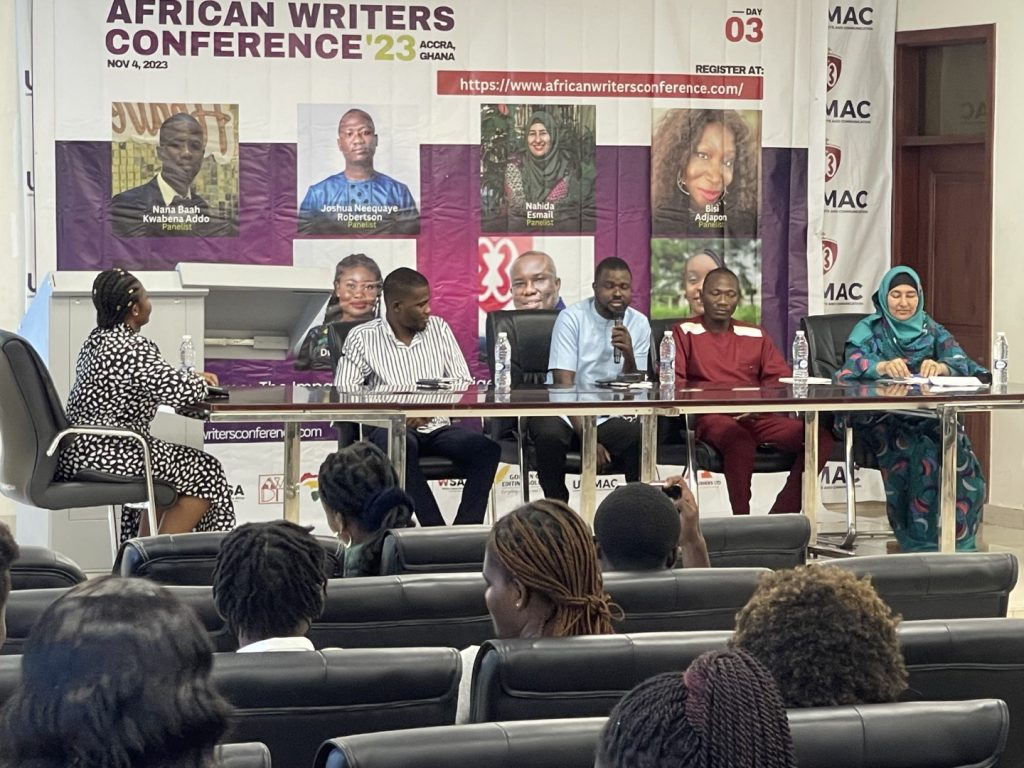
The panelists also emphasized the importance of writers supporting one another. They encouraged the audience, particularly students, to engage in activities such as purchasing books, sharing submission opportunities, and organizing writing workshops. They also highlighted various platforms available to support emerging writers, including the monthly WSA magazine, the African Writers Awards, the Wakini Kuria Prize for Children’s Literature, and the African Teen Writers Awards.
Following the panel discussion, the winners of the African Writers Awards, the Wakini Kuria Prize for Children’s Literature, and the African Teen Writers Awards were announced. The full list of winners can be found on the official website of the African Writers Awards or by clicking here.
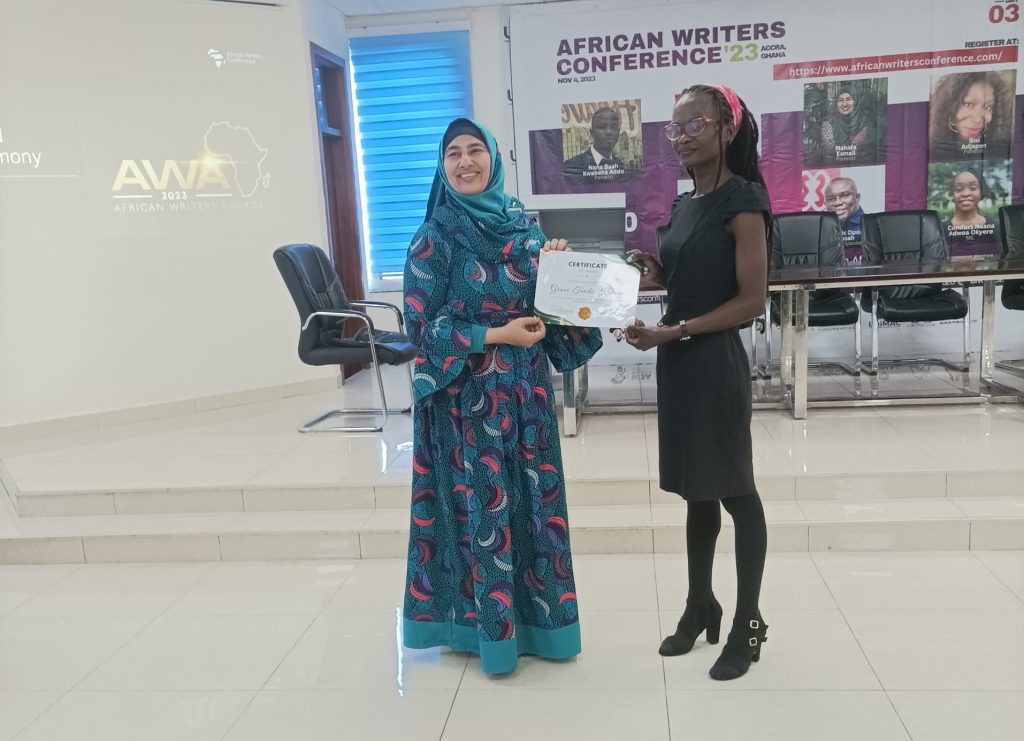
To mark the successful conclusion of the conference, participants gathered for a picnic at the Legon Botanical Gardens on November 5th. The event provided an opportunity for attendees to celebrate the achievements of the conference while enjoying a shared meal and cake.
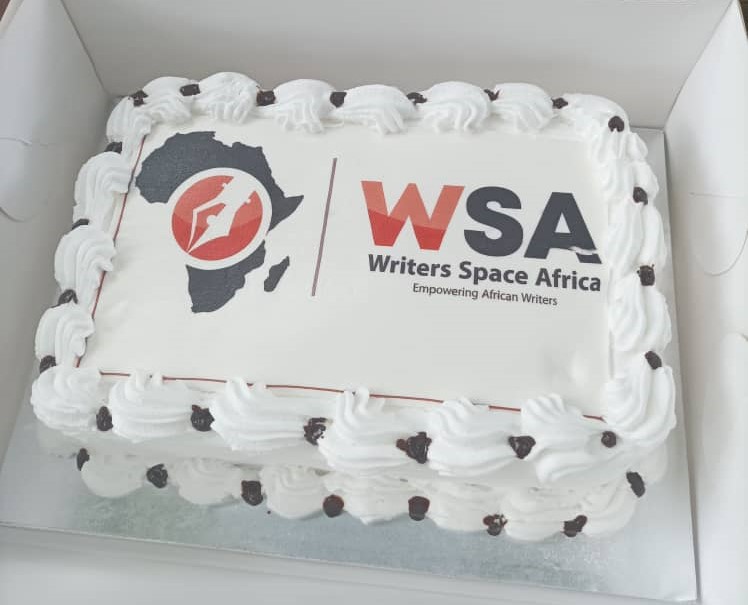
The conference’s local organizing committee, led by Efua Eshun, expressed gratitude to the various partners who contributed to the success of the conference. These partners included Writers Space Africa, the African Writers Development Trust (AWDT), the Department of Language and Communication Skills of the University of Media, Arts and Communication (UniMAC) – Institute of Journalism, Alliance Francaise d’Accra, E-Ananse Library, Golden Quill Editing Solutions, and Acacia Publishers Limited.
Looking ahead, the next African Writers Conference is scheduled to take place in Kigali, Rwanda in 2024. The anticipation is high for another dynamic gathering of literary minds from across the continent, as the conference continues to foster creativity, collaboration, and the celebration of African literature.
Read about the previous conferences below
2022 African Writers Conference
2021 African Writers Conference
2020 African Writers Conference
2019 African Writers Conference
2018 African Writers Conference
Kudos to the award winners!
Bravo to the initiators and organisers of this prestigious convocation.
I truly appreciate the balanced views on the use of AI. I find the report insightful.
Thank you. Enkosi. Rea leboga.
You are welcome.
May i please send to you a synopsis of my book plus three first chapters of the book.
Best Regards
Thanks for your comment, but we are not a publishing outfit.